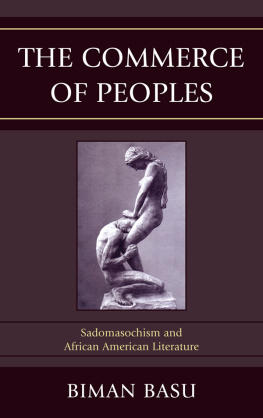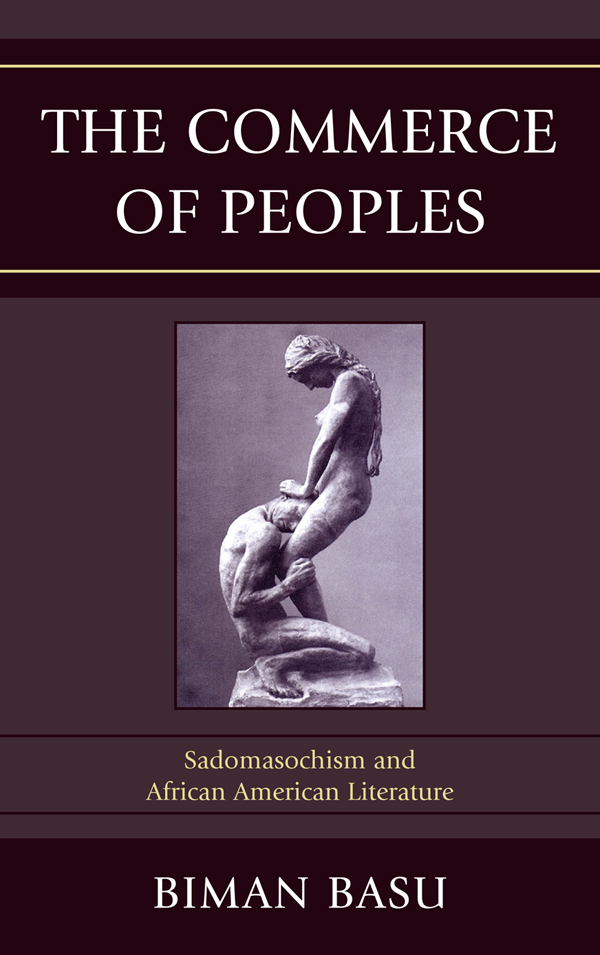The Commerce of Peoples
The Commerce of Peoples
Sadomasochism and African American Literature
Biman Basu
LEXINGTON BOOKS
Lanham Boulder New York Toronto Plymouth, UK
Published by Lexington Books
A wholly owned subsidiary of The Rowman & Littlefield Publishing Group, Inc.
4501 Forbes Boulevard, Suite 200, Lanham, Maryland 20706
www.rowman.com
10 Thornbury Road, Plymouth PL6 7PP, United Kingdom
Copyright 2012 by Lexington Books
All rights reserved. No part of this book may be reproduced in any form or by any electronic or mechanical means, including information storage and retrieval systems, without written permission from the publisher, except by a reviewer who may quote passages in a review.
British Library Cataloguing in Publication Information Available
Library of Congress Cataloging-in-Publication Data
Basu, Biman.
The commerce of peoples : sadomasochism and African American literature / Biman Basu.
p. cm.
Includes bibliographical references and index.
ISBN 978-0-7391-6743-4 (cloth : alk. paper) ISBN 978-0-7391-6744-1 (electronic)
1. American literatureAfrican American authorsHistory and criticism. 2. Sadomasochism in literature. I. Title.
PS153.N5B36 2012
810.9'896073dc23
2011053325
The paper used in this publication meets the minimum requirements of American National Standard for Information Sciences Permanence of Paper for Printed Library Materials, ANSI/NISO Z39.48-1992.
Printed in the United States of America
Contents
Acknowledgments
| 3 | Slave Narratives and Sadomasochism |
| 4 | The Genuflected Body of the Masochist in Richard Wright |
| 5 | Dominant and Submissive in Protest Literature |
| 6 | Hybrid Embodiment and an Ethics of Masochism: Nella Larsens Passing and Sherley Anne Williamss Dessa Rose |
| 7 | Perverting Heterosexuality: The Competent Practice of the Object in Selina, Sula, Ursa |
| 8 | Neoslave Narratives and Sadomasochism |
Appendix: A Pragmatics of the Perverse: Nietzsche and the Discursive Formation of S&M
Works Cited
Index
About the Author
Acknowledgments
I would like to thank a host of people for their help and support, and I am sure this list will fall far short of my intentions. I thank my colleagues at Hobart and William Smith Colleges, among them, Lee Quinby, Jim Crenner, Grant Holly, Eric Patterson, Liz Lyon, David Weiss, and others. I thank Anna Creadick for her support and useful suggestions in the publication process. For technical help and support, I thank Sandra Dobson, Tina Smaldone, and Anustup Basu. For their careful and detailed reading of my manuscript, I thank my editors at Lexington Books Justin Race and Karen Ackermann. For their understanding and support over the years, I thank my brothers-in-law Tarak Saha and Anustup Basu, and my sisters Banani Saha and Manisha Basu.
The following materials are gratefully used by permission:
Excerpts from Kindred copyright 1988 by Octavia E. Butler. Reprinted with permission from the Estate of Octavia E. Butler.
Excerpts from Black Boy , copyright 1937, 1942, 1944, 1945 by Richard Wright; renewed copyright 1973 by Ellen Wright. Reprinted by permission of HarperCollins Publishers.
Excerpts from Beloved by Toni Morrison, copyright 1987 by Toni Morrison. Used by permission of Alfred A. Knopf, a division of Random House, Inc.
Excerpts from Passing by Nella Larsen, copyright 1991. Reprinted by permission of Ayer Publishers.
Chapter 4 appeared originally in Public Culture 16, no. 2, copyright 2004, Duke University Press. Reprinted by permission of the publisher.
Chapter 6 appeared originally in African American Review 36, no. 3 (Fall 2002): 383401.
Chapter One
Introduction
Sadomasochism (S&M) as I consider it in this book has emerged fairly recently in the last three decades or so, and in this brief introduction I want to establish two basic claims which will inform the following chapters, claims that we might understand as ideological and historical. The first is, in fact, derived from the recent emergence of this new practice. The newness of contemporary sadomasochism may be understood in many ways, but above all perhaps, it is the hope, the encrypted utopia in its practice, for the arrival of new values. The hope is that the values sedimented in the ideological categories of race, gender, and sexuality will be deformed by the past-present-future trajectory of this utopian practice.
The second claim, rising from the utopic past-present-future trajectory, is that contemporary sadomasochistic practice is a rigorously historical practice. As such, it cannot be extricated from the histories of slavery and colonialism, and while these histories are diverse and worldwide, for an analysis of African American literature, it is slavery in the United States that will concern us most. As a historical practice, sadomasochism cannot be adequately theorized without a consideration of race, and the notable absence of race in discussions of sadomasochistic practice has been acknowledged by several writers. This book is a contribution to the study of African American literature, to the theorization of sadomasochism, and to an understanding of the function of race in its practice.
It is inadequate to theorize sadomasochism without examining its relation to the histories of slavery and colonialism, and it is difficult to do so without the specter of these histories palimpsestically underwriting sadomasochistic practice. But sadomasochism is a historical practice not only in its relation to these histories. It is also a response to a mesh of discursive formations formed over the last three centuries, a network that signals a modulation of power and the emergence of a modality of power that Michel Foucault calls discipline. In sadomasochistic practice and in slave narratives, neo-slave narratives, and in critical discussions, certain forms of these corporal punishmentswhipping, and more literally, brandingare described as a scripting of the body. The scripted body is a response to, and an unfettering of, the body enmeshed in the discursive formations mentioned above.
Since then, gay men and lesbian women have, through the twentieth century, appropriated the terms, gay and lesbian, and the broader term, homosexual, as markers of their identities. In academic discourses, perversion itself has been appropriated as a domain of analysis by gay and lesbian scholars. Women and black people too have interrogated gendered and racial stereotypes (the hysterical woman, the black rapist, the oversexed black female, etc.) attributed to them in the nineteenth century. The African American struggle for racial justice, the womens movement, and the gay and lesbian movement have accomplished much in this way by rejecting, modifying, clarifying, and appropriating the discourses of the nineteenth century in the course of the twentieth century.
The rigorous and separate territorializations of different sexualities (heterosexual, homosexual, bisexual, transgendered) and of the different ideological categories of analysis (race, gender, sexuality) cannot be maintained. In fact, the nomadic and indiscriminate incursions of several terms and concepts into these separate terrains of analysis and distinct identities suggest that territorial autonomy is not methodologically viable. The territorial intractability of terms like passing, coming out, being closeted, straight, normal all indicate the lexicographical deterritorializations of these spaces. While David M. Halperin comments specifically against the prevailing predilection to construct identities based on sexuality, his comments may be more generally useful when he suggests that we might refuse to individuate human beings at the level of sexual preference and assume, instead, that we all share the same fundamental set of sexual appetites, the same sexuality (27).










